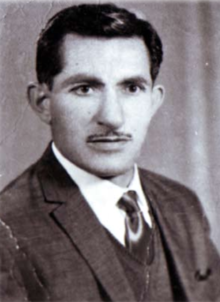Hesen Zîrek
Hassan Zîrek , also Hassan Zirak (* 1921 in Hermila near Bukan , Iran; † 1972 ), was a Kurdish singer of the Soran dialect . He was one of the most famous Kurdish folk music singers and is still popular today. In the course of his life he recorded about 1,500 songs.
Live and act
Hassan Zîrek was born in 1921 as the son of Abdullah and Amina Zirek in the small village of Hermila near Bukan. Hassan also has a brother and a sister, Hussein and Mina. Zîrek showed his talent for singing at an early age. Before that, his rather poor family had no singers in the family and did not promote his talent. When he was just five years old, his father, with whom he had a very close relationship, died. His mother remarried a short time later, which affected him emotionally. At the age of 13, the illiterate Zîrek left his home village and started working in restaurants in the Kurdish cities of Iran. In the late 1940s he went into exile, where he led a very hard life. He was thrown in prison and tortured several times .
In 1953 he went to Iraqi Kurdistan and gave many of his songs in Kurdish to the local station in Baghdad . So its popularity increased quickly, especially in the Kurdish areas. His ability to sing songs in other languages such as Arabic , Persian , Turkish or Azeri also made him known outside the Kurdish regions . After the revolution in Iraq in 1958, he was expelled from the country and forcibly returned to Iran. There he recorded many of his best known songs on the radio station "Radio Kermanschah". He shaped hundreds of Kurdish folk songs with his own style. At the end of 1959 he went to Tehran , where he began to work for "Radio Tehran". There he met his future wife Medya Zendi. In 1960 he was expelled from Iran. This time he did not return to Baghdad, but drove to the Kurdish areas of northern Iraq, where he stayed for a long time, despite the entry ban. From the 1960s he commuted back and forth between Iraq and Iran and recorded most of his songs at house concerts. Not uncommon for Kurdish music, these were resold as cassettes in markets under the name of the respective house owner, which quickly increased its popularity. Despite this popularity, Zîrek lived in modest circumstances and never really earned anything from his music. In 1967 the authorities expelled him again from the country. This time he went to Saqqez in Iran, where he stayed until the end of his life.
Due to his excessive alcohol consumption , Zirek's health deteriorated rapidly in the early 1970s. In 1971 he was diagnosed with terminal cancer. Hassan Zirek died at the age of 51 years to cancer . On June 26, 1972, he was buried in his native Bukan on Mount Nalishkêne.
Personal
Despite his renowned music and the great respect that was shown for him as an artist, Zîrek was never a properly socially recognized person. Many of his house concerts, where he recorded music, took place with socially marginalized families. Furthermore, Zîrek was considered an unfaithful husband who often sang subtly about his conquests in his songs and named many of his songs after his affairs.
Zirek and his wife Midya Zand had two daughters (Arezoo & Sakar) who currently live in Tehran .
legacy
Many singers of his time, such as Mohammad Mamle , Mala Hussein Abdulzada, Osman Bukani or Ahmad Shamal, but also today, describe him as a decisive influence on their singing. Even today his music is omnipresent in the bazaars and markets of Kurdistan and is very much appreciated by all parts of the population.
Web links
- Biography on geocities ( Memento from December 4, 2007 in the Internet Archive )
| personal data | |
|---|---|
| SURNAME | Zîrek, Hesen |
| ALTERNATIVE NAMES | Zîrek, Hassan |
| BRIEF DESCRIPTION | Iranian Kurdish singer |
| DATE OF BIRTH | 1921 |
| PLACE OF BIRTH | Bukan |
| DATE OF DEATH | before June 26, 1972 |

